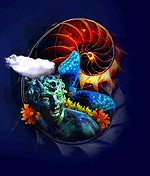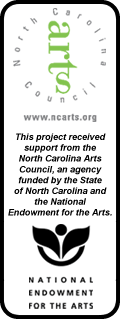|
|
Love & Memory
Fuad Attal
Cross-Cultural Communications
ISBN Number: 0893047902
Reviewer: JoSelle Vanderhooft
You can't judge a book by its cover, as the old saying goes. Yet there is something very special about the front of Love & Memory, Fuad Attal's second poetry collection. It's a lush, vibrant painting by Abdellah Akhdi that appears to incorporate a human face, leaves, and a small labyrinth. The warm, friendly hues of this picture and the three oil and acrylic interior illustrations—a portrait of a Muslim woman, a New York City street scene and an impressionistic view of two little girls in a garden—catch the eye immediately. They literally paint a picture of the Palestinian immigrant life which Attal writes of so passionately in the book's forty-four pages. Indeed it almost seems that Akhdi's illustrations and Attal's words would be diminished without each other's support—a sure sign of a smartly-conceived and thoughtfully-produced chapbook.
The life in Akhdi's paintings readily lends itself to the fourteen poems which make up Love & Memory, a bilingual text which includes the poems in the original Arabic alongside Attal's English translations. When Attal writes of Jerusalem in "Inspiration of Jerusalem," one can almost see the vibrant colors—indigo, crème, beige, crimson, burnt sienna—in his lively descriptions of this ancient city:
Peasant women were sitting in their traditional clothes
Selling fruits and vegetables, calling on people to come and buy.
Tourists were amazed at paintings and handicrafts.
In Jerusalem, you have to bargain before you buy.
On every corner, children were chasing tourists
For them to buy candy and chocolate.
There was a coffee shop and a bakery.
People sat outside eating and drinking,
And, many times, smoking a hookah.
In many shops, the music was loud and the drums were beating.
While Attal uses evocative language to describe Jerusalem, he is much more reserved when writing about New York, the city he currently calls home. By juxtaposing the much faster-paced New York City with Jerusalem, Attal evokes the sense of confusion and displacement immigrants often experience when trying to live in a new environment:
The life rhythm is fast
In New York City.
I'm always out of time,
Rushing to work,
Rushing from work.
New York is a strange city
With strange people.
It is a mixture of people and things
And views like a bazaar…
It's a busy and noisy city,
Mechanical and practical,
Sometimes emotionless.
I can't be anywhere else.
My country is occupied.
I'm trapped between tall buildings
And gloomy avenues.
I am a nameless man
In a wild, famous city.
While Attal is highly skilled at documenting the culture shock of immigrants, his greatest talent lies in his more contemplative work, his meditations on love, God and the changing of the seasons. The chapbook's loveliest poem by far is its title work, in which the speaker contemplates the elusive nature of love. It begins with these words, which seem indebted, at least in spirit, to the 11th century Sufi poet Jalaluddin Rumi:
I am a burning cigarette,
Soon I will turn into ashes.
I am mud and water in my soul,
God's spirit, a sparkling light and shocking thunder.
Women of earth, is there among
You a woman like a drop of water at dawn?
Like the sunset? Like winter rain
Or like the heat of the sun that burns me
And turns me to the dust that is thrown to the wind?
Though not as precise as "Love & Memory" in image and detail, "Autumn" is a gentle contemplation of the poet's mortality as he sees it reflected in his favorite season. Likewise, the politically charged "Whispers of War" examines the cost of war through a prayer directed to an enemy soldier. In both poems, Attal's visuals are startling; birds leaving their nests hungry, the fluttering of leaves, a man wandering through black smoke in search of "a singing bird in a green garden".
Although Attal's poetry is visually striking and refreshingly candid in sentiment, the poet is still occasionally tripped up by the occasional overwrought phrase. In "Guitar Player," one of the collection's weaker poems, the titular speaker talks about the wealthy people around him in terms that could best be described as clichéd. "They can buy many things," he says, "but they can't buy love from the heart." In poems such as "Guitar Player" and Attal's well-intentioned "Waitress!" (about an overworked server), awkward moments such as these occur with a distressing frequency for a poet of Attal's obvious skill. Thankfully, these weaker moments are significantly overshadowed by the collection as a whole. Overall, Love & Memory is a gorgeous but all too brief collection which leaves the reader eagerly anticipating the third collection. As Attal has been known to read his work aloud at several public libraries and poetry festivals in New York City (including the famous Nuyorican Café), perhaps a denizen of this same "wild, famous city" may get lucky enough to hear his words in person in the meantime.
|
|



